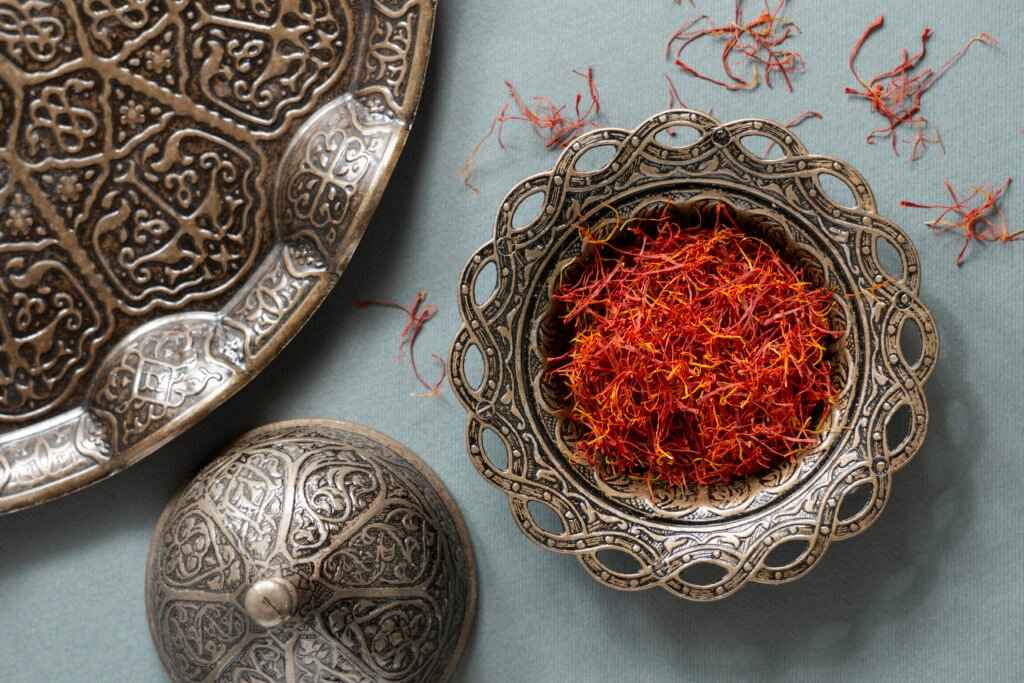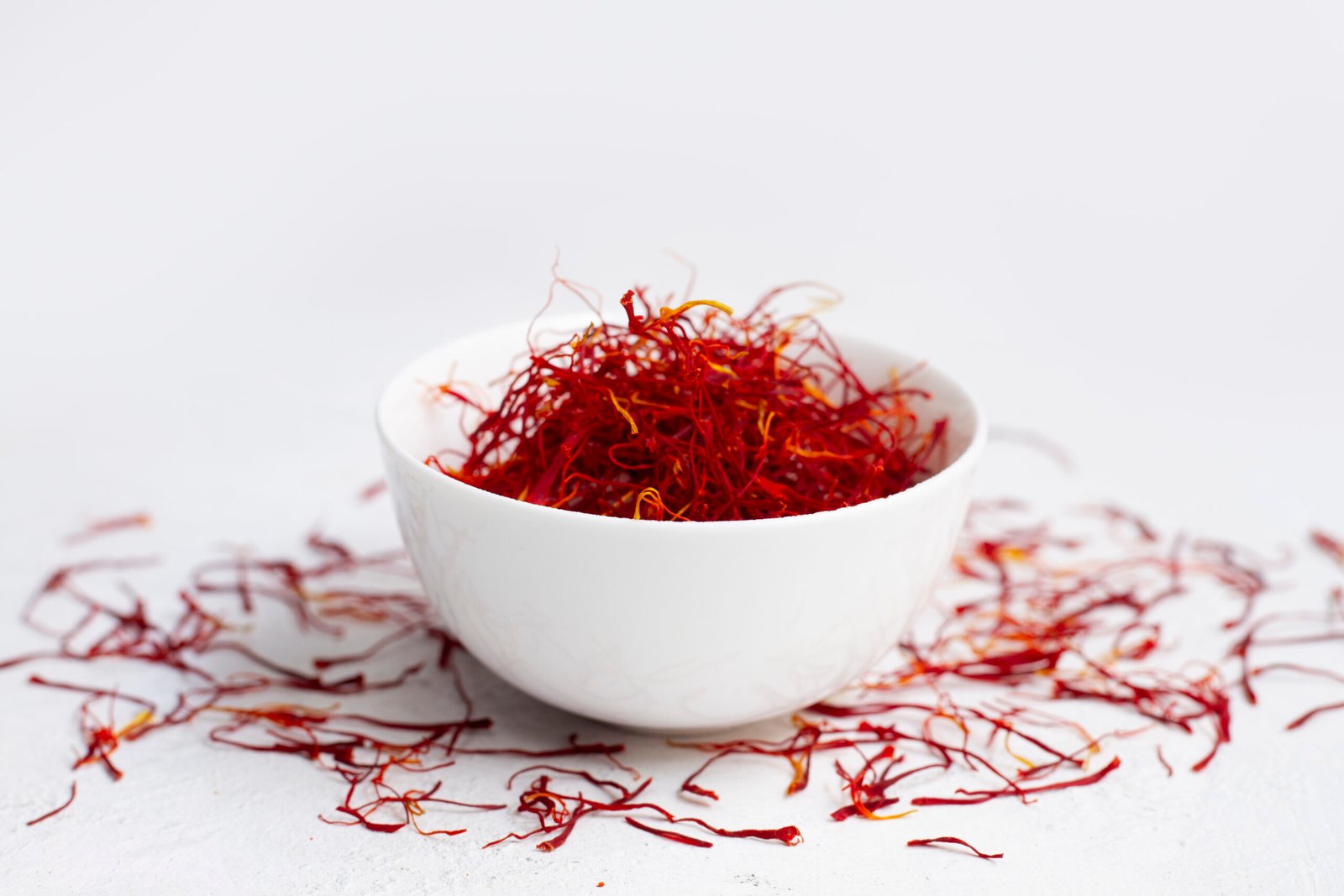Saffron, often called the “golden spice,” has long been valued not only as a culinary treasure but also as a natural remedy for body and mind. Modern research has confirmed many of its traditional uses, showing that saffron benefits and bioactive compounds—crocin, safranal, and picrocrocin—possess strong antioxidant, anti-inflammatory, and mood-enhancing properties.
Chemical Composition and Active Components
Saffron is derived from the dried stigmas of Crocus sativus L.. Its powerful therapeutic effects come from a unique combination of compounds:
- Crocin: A carotenoid responsible for saffron’s deep red color; it has antioxidant and neuroprotective effects.
- Picrocrocin: Provides the characteristic bitter taste and contributes to digestive and anti-inflammatory actions.
- Safranal: The aromatic compound that gives saffron its distinctive fragrance, known for its calming and antidepressant effects.
- Flavonoids and other carotenoids: Support cellular protection and help prevent oxidative stress.

Health Benefits of Saffron
Supports Mood and Emotional Balance
Saffron has been recognized as a natural mood enhancer. Studies show that it helps elevate serotonin and dopamine levels in the brain, improving mood and reducing anxiety and depression. In several clinical trials, saffron supplements were found to be as effective as conventional antidepressants such as fluoxetine, but with fewer side effects.
Promotes Heart Health
Saffron helps improve circulation, strengthen the cardiovascular system, and reduce oxidative stress that can damage blood vessels. Its antioxidant compounds may lower LDL (bad) cholesterol and support overall heart function.
Enhances Brain Function and Memory
Saffron’s crocin content has neuroprotective effects, helping to prevent age-related cognitive decline. Studies suggest saffron may help slow the progression of Alzheimer’s disease by reducing beta-amyloid accumulation in the brain. Regular consumption can also improve memory, focus, and learning ability.
Supports Digestive Health
Saffron stimulates the secretion of digestive enzymes and promotes healthy digestion. It can relieve bloating, mild stomach discomfort, and loss of appetite. Traditionally, saffron tea after meals has been used to aid digestion and prevent indigestion.
Promotes Women’s Health
Saffron has natural properties that help regulate menstrual cycles and relieve premenstrual and menstrual discomfort. Research also indicates that it can help with symptoms of PMS, mood swings, and mild cramps. However, during pregnancy, excessive intake should be avoided as it can stimulate uterine contractions.

Anti-inflammatory and Antioxidant Effects
The rich array of carotenoids and flavonoids in saffron neutralizes free radicals and reduces inflammation throughout the body. These effects make saffron beneficial in supporting joint health, alleviating arthritis symptoms, and protecting the body against chronic diseases.
Eye Health and Vision Protection
Recent research shows that saffron may improve visual performance and slow the progression of age-related macular degeneration (AMD). Crocin and safranal improve retinal blood flow and protect photoreceptor cells from oxidative stress.
Boosts Sexual Health and Fertility
Saffron is widely known as a natural aphrodisiac. Clinical studies show that it enhances libido and sexual performance by improving blood flow and increasing levels of serotonin and other mood-enhancing hormones. It may also improve sperm motility and ovulation quality.
Strengthens the Immune System
With its antioxidant and vitamin-rich profile, saffron helps the immune system function more effectively. It enhances white blood cell activity, helping the body defend against infections and illnesses.
Potential Anti-Cancer Properties
Laboratory studies indicate that saffron and its main component, crocin, may inhibit the growth of cancer cells and prevent genetic mutations. Its antioxidant activity protects DNA from oxidative damage and supports cellular repair mechanisms.

Recommended Dosage and Safety
Saffron is safe when used in small amounts—typically up to 1.5 grams per day. Consuming excessive quantities may cause dizziness, nausea, or increased heart rate. During pregnancy, large doses should be avoided due to its potential to stimulate uterine contractions.
Precautions and Contraindications
- Pregnancy: Avoid high doses; consult a healthcare professional before use.
- Warm body constitution: People prone to heat sensations, skin redness, or restlessness should consume saffron moderately.
- Low blood pressure: Saffron may slightly lower blood pressure due to its mild relaxing properties.
Saffron and Mental Wellness
Saffron’s ability to enhance mood, reduce anxiety, and promote relaxation has made it a popular natural alternative to synthetic antidepressants. It supports emotional balance, combats stress, and can improve overall sense of wellbeing. Drinking saffron tea regularly is a gentle way to lift mood and reduce fatigue.
Saffron and Sleep Quality
Thanks to its calming effect on the nervous system, saffron helps promote deeper and more restful sleep. Combining a few saffron threads with warm milk before bedtime can help relieve insomnia and nighttime anxiety.
Saffron for Skin and Beauty
Saffron’s antioxidants support skin regeneration and protection against environmental stress. Used topically in masks or infused oils, it helps brighten the complexion, reduce fine lines, and maintain youthful, glowing skin.

Scientific Evidence and Modern Research
Contemporary research confirms many of the traditional health claims about saffron:
- Depression & Anxiety: Comparable in effect to fluoxetine and imipramine, with fewer side effects.
- Cancer Prevention: Inhibits growth of breast, lung, and colon cancer cells.
- Blood Sugar Regulation: Improves insulin sensitivity and supports healthy glucose levels.
- Heart Health: Promotes vasodilation and reduces oxidative damage.
- Eye Health: Improves retinal function in age-related macular degeneration.
- Reproductive Health: Enhances sperm quality and supports fertility in both men and women.
Culinary and Lifestyle Uses
Beyond its medicinal value, saffron is an exquisite spice that elevates both taste and mood. Adding a pinch of saffron to rice dishes, desserts, or beverages brings warmth, aroma, and subtle energy. It harmonizes body and mind, making it not only a food ingredient but also a symbol of vitality and joy.
Storage and Quality Tips
To preserve saffron’s potency, store it in a sealed glass container away from light, heat, and moisture. Exposure to air and sunlight causes the delicate aromatic oils to evaporate and the spice to lose its strength and color.
How to Use Saffron
Saffron can be used in several practical ways to enjoy its health benefits:
- Saffron Tea or Infusion: Add 0.5–1 gram of saffron threads to one liter of hot water. Let it steep for 10–15 minutes and drink one to two cups daily.
- Warm Milk with Saffron: A soothing bedtime drink that promotes relaxation and better sleep.
- Saffron Syrup or Elixir: Can be made with honey or sugar to enhance mood and energy.
- Saffron Oil: Useful for massage and topical application to support joint health and radiant skin.
- Cooking Ingredient: Adding saffron to rice, desserts, or soups enhances both flavor and nutritional value:
5.1: Safran Şerbeti (Saffron Cordial)
5.2: Saffron, Pistachio, and Rose Petal Helva
5.3: Sholeh Zard (Saffron Rice Pudding)
You can find more recipes through this link.

Conclusion
Saffron stands as one of the world’s most precious and health-promoting spices. Rich in antioxidants and bioactive compounds, it supports physical vitality, emotional balance, and mental clarity. Whether enjoyed as a tea, supplement, or culinary delight, saffron offers a natural path toward wellness and harmony.
With its remarkable blend of aroma, color, and healing power, saffron truly embodies the essence of holistic health—a gift of nature that nourishes both body and soul.
Be healthy with WiserHealth.
FAQs
What is saffron?
Saffron is a precious spice made from the dried stigmas of the Crocus sativus flower. Known for its deep red color and unique aroma, it’s one of the most valuable spices in the world and has been used for centuries for both culinary and medicinal purposes.
What are the main health benefits of saffron?
Saffron is known for improving mood, enhancing memory, supporting heart and eye health, aiding digestion, and reducing inflammation. It also acts as an antioxidant and may have cancer-preventive and fertility-enhancing properties.
Can saffron really help with depression or anxiety?
Yes. Several clinical studies show that saffron extract can help reduce symptoms of mild to moderate depression and anxiety. It naturally boosts serotonin and dopamine levels in the brain—chemicals responsible for emotional balance and happiness.
How much saffron should I take per day?
The recommended daily amount is typically 0.5 to 1.5 grams. This small quantity is enough to deliver its health benefits. Taking large amounts may cause side effects such as nausea, dizziness, or restlessness.
Is saffron safe during pregnancy?
Saffron in small culinary amounts (like in food or tea) is safe. However, high doses or concentrated supplements should be avoided during pregnancy, as they may stimulate uterine contractions. Always consult a healthcare professional before using saffron supplements if you are pregnant or breastfeeding.
How can I use saffron in my daily routine?
You can add a few saffron threads to hot water to make tea, mix it with warm milk, or use it in cooking—especially in rice, soups, and desserts. Saffron-infused drinks are a relaxing way to benefit from its mood-boosting effects.

Leave a Reply